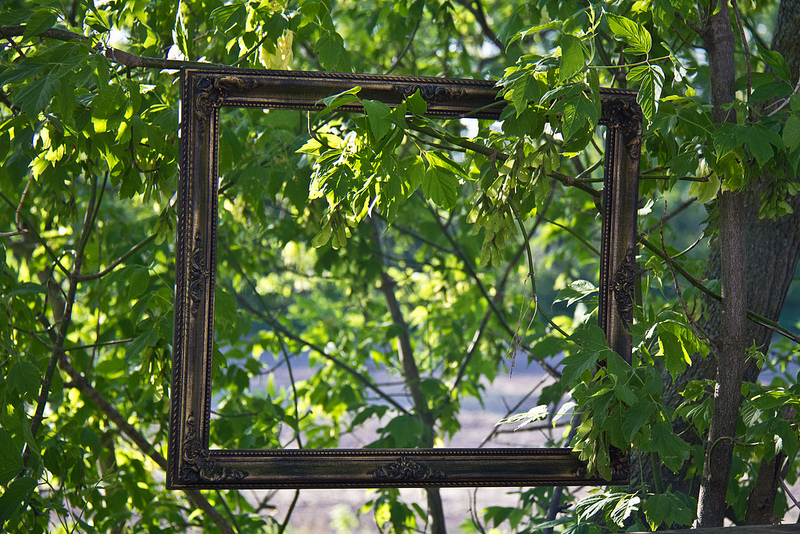Barefoot, Todd chased after the shadow thief, nearly tripping over his pyjama pants. He didn’t know what it was or where it had come from, but it had stolen the horse leg from Anya’s carousel. He had to get it back. Without it, Anya would never forgive him. The sound of the storm outside muffled the pitter-patter of his feet as he scrambled up the attic stairs. But there was no sign of the thief when he rushed inside. The full moon shone through the window pane and lit the room up. His foot stepped on a ruffled piece of paper. He bent over and picked it up. It was one of Mary-Anne’s photographs.
Todd stared down at the picture as he remembered the Sunday morning it had been taken. They were making breakfast. Papa had cracked the eggs on the edge of the counter while Todd guarded the sizzling bacon and toasting bread.
“Morning, sunshine,” Papa said as Anya shuffled into the kitchen.
Anya stretched her arms out and yawned. “What are you doing,” she had asked. “Pancakes,” Todd exclaimed, wearing Papa’s necktie around his head and an old pair of black sunglasses.
With a flick of the wrist, she flipped the pancake. As soon as it splotched back onto the pan, Todd rushed in front of her and smacked the pancake with his spatula. When both sides turned golden-brown, Papa gave them a thumbs-up and held out a plate.
Papa said: “Watch out!” and pointed to the stove. While the children had their backs turned, he swiftly snatched the pancake. Anya ran after him, while Todd crawled under the table, but he had gobbled it up before they had caught him.
Anya poured another spoonful into the pan. “Just try and get this one,” she warned, waving the wooden spoon.
Todd tugged on Anya’s apron. “Can I try?”
She nodded and lifted her arm to let Todd slip under. He placed his hands on the handle like Anya. At that moment, Mary-Anne had walked into the kitchen, holding her camera and had taken a picture of them just as they jerked upwards. Taken by surprise, Anya had burnt her hand and the pancake had landed with a splatter on the floor.
Todd’s thoughts were halted by a flicker out of the corner of his eye. His hand clenched tightly around the photograph as he looked around the attic. All of Mary-Anne’s photographs had been ripped from the wall, crumpled in a ball or torn apart. Turning, Todd saw the shadow rear up to its full height. The scream welling in Todd’s throat was silenced by the shadow’s hand covering his mouth. It almost looked alarmed, shaking its head wildly and bringing a dark finger to the line where its lips should have been. Todd didn’t have any more time to think as the shadow thief scooped up a white sheet and enveloped him, sending Todd into a world of darkness.
The bag swung back and forth. Todd felt as though he were falling as his stomach looped several times over. He would have been sick if he hadn’t been able to maintain his sense of balance within his makeshift cage. Searching the sheet Todd found a small hole just big enough to see through. He gasped when he realized how high they were. The shadow was quickly sliding down a tree using his hooked feet and hands. Underneath them, a potbellied man sat on a tree stump with his long slender legs crossed. The man wore a scarlet tailcoat with golden buttons that looked a bit tight for him, a shock of red hair stood up from his head in every direction. He stirred his tea as though he enjoyed the sound of the silver spoon when it clinked along the edges of the cup.
The shadow dropped Todd and plonked onto the hard ground, still trapped in the bag.
“Did you find it?” asked the man, lifting his head. On the tip of his crooked nose perched a pair of golden spectacles.
Todd felt the shadow leave his side and saw it approach the old man. The latter extended his hand, palm upraised as if expecting a gift. From his spot in the bag, Todd watched as Anya’s horse leg was exchanged between the two. For some reason, this old man scared him and he was glad to be in the bag. Even the shadow appeared to be quivering. Once the horse’s leg was dropped into man’s hand, the shadow withdrew itself as though it were burned by fire. It hurried back toward Todd and seemed intent on taking him away.
“Wait.”
Todd felt the shadow freeze.
“What do you have in the bag?”
The shadow said: “Stuff,” and backed away.
“Empty it.”
In an instant, Todd found himself rolling on the ground, but it was like no ground he had ever seen before. Puffs of mist formed as he breathed out into the chilly air. All around him was a forest of stumps.His eyes fell upon the only tree, a massive bulk with gargantuan branches. Hanging from the branches were various wooden picture frames that swayed in the breeze.
The man pointed a finger at the young boy. “What is that?”
“I panicked,” replied the shadow. “He followed me and— she was coming.”
“So you took him?”
“Let me keep this one,” pleaded the shadow.
“This is not the child I asked for!”
Todd felt the shadow recoil beside him as the man towered over both of them. He looked at his kidnapper and then up into the cold eyes of this man who appeared to rule a dead world. One thing dawned suddenly in Todd’s mind: Anya was in danger.
← Go back – – – Go forward →
